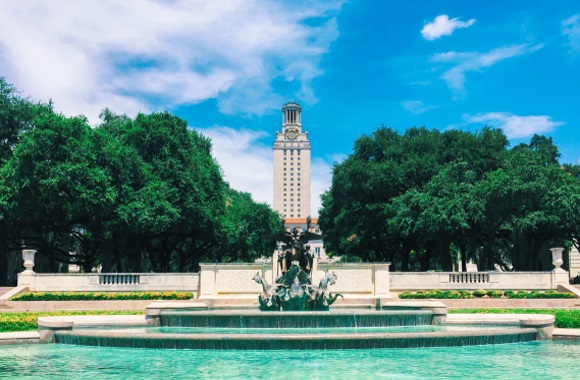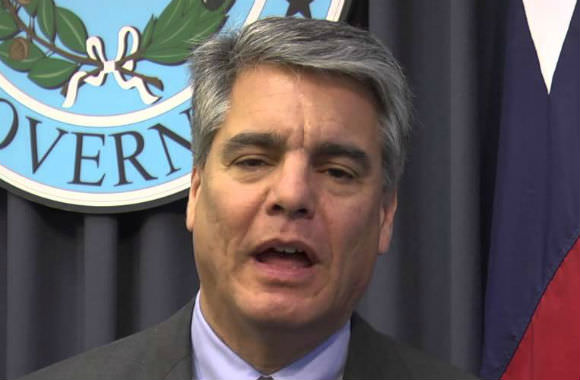
Calls bias response team ‘clenched fist in the velvet glove of student speech regulation’
The University of Texas-Austin has repeatedly claimed it has no intention of punishing students who wish to make politically conservative arguments, despite its written policies against “rude,” “offensive” and “uncivil” speech.
If this is true, “why maintain the policies at all?”
That was the question the 5th U.S. Circuit Court of Appeals posed to the taxpayer-funded university in a ruling Wednesday, reinstating a First Amendment lawsuit by Speech First.
U.S. District Judge Lee Yeakel was “mistaken” to declare the nonprofit had no legal standing to represent its student members at UT-Austin, who claim their conservative speech has been chilled by the university speech code.
“The chilling effect of allegedly vague regulations, coupled with a range of potential penalties for violating the regulations,” constitutes enough “injury” for Speech First to have a “personal stake” in the lawsuit, according to the opinion by Judge Edith Jones.
Yeakel also mischaracterized the power of the Campus Climate Response Team, the university’s name for its bias response team, according to the ruling. While he said the CCRT does “not engage in investigations or punishment of any sort,” the 5th Circuit called the team “the clenched fist in the velvet glove of student speech regulation.”
MORE: Iowa State reformed its BRT amid our investigation
By virtue of “invit[ing] anonymous reports” to be filed, the CCRT “carries particular overtones of intimidation to students whose views are ‘outside the mainstream,'” the opinion reads, alluding to students with conservative viewpoints on a campus dominated by progressives.
But Jones and her colleagues did not issue an injunction against UT’s policies, noting Yeakel “did not move on the merits” of the lawsuit when he ruled Speech First lacked standing and the university might yet revise its policies to “moot certain issues.” The 5th Circuit remanded the case to his court to reconsider the sought injunction.
The ruling was functionally unanimous on the three-judge panel of Jones, Carolyn Dineen King and Gregg Costa, the last of whom concurred in the judgment but did not write out his reasoning. Two of the judges are Democratic appointees.
Speech First President Nicole Neily praised the reinstatement of the lawsuit.
“We continue to believe that the University’s policies, including the ones it tried to abandon after we filed suit, are blatant violations of the First Amendment,” she wrote in an email to The College Fix.
The ruling is “an important precedent in our current and future cases,” according to the group’s official statement. It was especially fond of the “clenched fist in the velvet glove” analogy by Judge Jones: “That paints quite a picture!” UT students have been reported to the CCRT for comments “on posters, fliers, social media, whiteboards, verbal comments, and even classroom behavior,” the group said: “What’s next?”
UT Director of Media Relations J.B. Bird provided a written statement: “The university is firmly committed to protecting and promoting the free speech of all students. We are reviewing the federal court ruling as we consider the best ways to continue to support freedom of expression.” He didn’t answer whether it would seek en banc review by the full court of 27 judges.
MORE: Judge upholds UT’s bias response team, doesn’t credibly threaten speech

Bans on several ‘isms’ and language that interferes with ‘individuality’
The 5th Circuit repeatedly calls attention to the broad language in the challenged policies, including “verbal harassment.” It’s defined as “hostile or offensive speech, oral, written, or symbolic,” that is “not necessary to the expression of any idea.”
Examples include “insults, epithets, ridicule, [and] personal attacks” based on “group membership” – not just immutable traits such as race, but also “ideology” and “political affiliation.” Punishment for violating these “Institutional Rules” include expulsion and denial of degree.
“Hate and Bias Incidents” has the same definition of verbal harassment. It “strongly encourages” students to report such conduct as “hosting a party with a racist theme” and creating “a hostile or offensive classroom environment.”
The information technology policy requires student to “Be civil. Do not send rude or harassing correspondence.” Punishments for this section include “criminal prosecution,” and UT says it suspends “several people each semester” for violations, showing the section is more than boilerplate.
The residence hall manual prohibits a variety of “isms,” plus “any other force that seeks to suppress another individual or group of individuals.” It also bans “[u]ncivil behaviors and language that interfere with” even the “individuality” of other students. Sanctions for violations run from mandatory “educational” modules and meetings with administrators to fines and forced room changes.
The CCRT (bias response team) acts as a clearinghouse that refers possible bias incidents to other offices, and it even makes preliminary judgments about whether a violation occurred. It accepts hearsay from anonymous students as well as from alleged victims and witnesses.
Speech First is representing three students who credibly fear punishment for simply expressing their views against abortion and affirmative action, in favor of gun rights and Israel, and in criticism of the treatment of Brett Kavanaugh in his Supreme Court confirmation hearings. Yeakel, the trial judge, tossed the case because he saw “no evidence” that students had even been “investigated” for their speech, and thus no “credible threat of enforcement.”
‘Offensive’ speech still banned in one untouched policy
Following a slew of friend-of-the-court briefs siding with Speech First’s appeal, the university “[u]nexpectedly” revised some policies, as the ruling put it.
It belatedly adopted the Supreme Court’s three-part test for harassment in educational contexts (“severe, pervasive, and objectively offensive”) and replaced “offensive” with “threatening” speech. References to “uncivil” and “rude” behavior were eliminated and the housing disciplinary process was eliminated.
Untouched, however, were policies on hate and bias and the CCRT itself. UT continues to investigate “offensive” speech that may only meet one of three elements – “sufficiently severe, pervasive, or offensive.”
This selective editing of policies drew concern from the appeals court. Since “harassment” hasn’t changed in the hate and bias policy, it’s not “absolutely clear” the university wouldn’t revert back on its other policies.
“This is not the first appeal in which a public university has had a sudden change of heart, during litigation, about the overbreadth and vagueness of its speech code,” the opinion says, pointing to the University of Michigan’s response to Speech First’s lawsuit against it.
The 6th Circuit refused to moot that case, however, citing “suspicious timing” and both the university’s refusal to issue a “controlling statement of future intention” and its “continued defense of the challenged policies.” The 5th Circuit would prefer to “avoid a circuit split” by going with its sister circuit’s analysis.
UT has neither offered a “sworn affirmative statement” that its challenged policies will stay dead, nor explained how former UT President Greg Fenves (below) still controls the decision, Jones wrote. (Fenves jumped ship to Emory University this fall.)
It’s clear the university had no intention to review the challenged policies before Speech First appealed, and it still claims “none of the challenged policies … prohibits any constitutionally protected speech in general.” In other words, there’s nothing to stop UT from resurrecting the policies as first challenged by Speech First, the opinion says.
MORE: UT unconstitutionally bans ‘rude’ and ‘insensitive’ speech

‘Nomenclature’ chosen by UT ‘does not alter reality’ of punishment
The appeals court agreed that Speech First’s members face “credible threats of enforcement” under the challenged policies or through referral to the CCRT, meaning Speech First has standing. “It is not hard to sustain standing for a pre-enforcement challenge in the highly sensitive area of public regulations governing bedrock political speech,” Jones wrote.
The 5th Circuit embarrassed Yeakel, the trial judge, in a footnote by saying his cited case law for denying standing “bears no resemblance” to this case. Yeakel cited two cases where the parties didn’t substantiate their intentions to go through with certain behaviors, which distinguishes them from Speech First’s case.
UT’s codes are so broad they arguably cover everything the conservative students want to debate publicly, Jones wrote: “These pejoratives” – such as “rude,” “incivility” and “bias” – “beg for clarification.” And the university “eliminated or materially altered” several definitions pending appeal, suggesting the university knew they applied to the desired activism of Speech First members.
The opinion rebukes the former UT president Fenves for ignoring the penalties in other challenged codes – all the way up to “criminal prosecution” – when he claimed speech is not “arguably proscribed” outside the Institutional Rules.
It also accuses the university of playing word games by limiting “student discipline” to conduct covered by the Institutional Rules. Students are still punished under the other codes, but it’s not described as such. The residence hall manual, for example, refers to “educational measure[s].” This is simply “nomenclature” and it “does not alter reality,” Jones wrote.
MORE: U. Illinois uses bias policies to silence conservative students
Again embarrassing Judge Yeakel, the appellate judges said the CCRT plainly plays a role in the investigation and punishment of students. Just like the University of Michigan’s bias response team, the CCRT makes referrals to other offices that punish students, making it “sufficiently proscriptive to objectively chill student speech.”
They went on to mock Fenves, who “wraps the University in the flag of its policies’ paeans to the freedom of speech.” The problem with the former president’s argument is that UT’s supposed “encourage[ment]” of speech does not appear in relevant parts of the challenged policies.
Even an explicit exception for making arguments on “the substance” of ideas is ambiguous, the 5th Circuit found:
Stated more precisely, the definition is this: “verbal harassment” includes “hostile or offensive” speech that “is not necessary to the expression of any idea [defined as “an argument for or against the substance of any political . . . idea].” Interpreted grammatically, the exclusion applies only to speech that conveys the substance of an idea and is necessary to such conveyance. …
It is likely that the University’s policies arguably proscribe speech of the sort that Speech First’s members intend to make.
MORE: UMich permanently shutters bias response team to resolve lawsuit
NEW: The Fifth Circuit has restored our case against the University of Texas.
We continue to believe that the University's policies are blatant violations of the 1st Amendment.
We look forward to vindicating our members' rights as litigation progresses.https://t.co/A98lFyC2UX
— Speech First (@Speech_First) October 29, 2020
‘Why maintain the plethora of potential sanctions?’
Speech First’s members are “arguably facially restricted by the University policies,” the opinion continues, noting that UT’s “public log of bias incidents” going back eight years shows exactly what gets students reported.
The “largest numbers of reported complaints” among the “hundreds of events” in the log pertain to Israel and affirmative action, the topics of choice for one Speech First member. The threat of enforcement is clear across the “intertwined policies,” which often refer to each other, the 5th Circuit said.
The university is wrong about relevant case law: Speech First members at UT belong to “a class subject to the challenged policies,” in contrast to failed arguments for standing by plaintiffs who fail to allege themselves “personally subject” to the challenged policies.
The judges were also unimpressed with the purported “compelling contrary evidence” Fenves and the university offered – that the policies had not been enforced “against the speech topics described by Speech First,” to their knowledge.
Lack of past enforcement isn’t a silver bullet, the opinion says. “Where the policy remains non-moribund, the claim is that the policy causes self-censorship among those who are subject to it, and the students’ speech is arguably regulated by the policy, there is standing.” The policies themselves qualify the supposed speech “rights” by saying they must adhere to open-ended “university rules.”
Finally, UT is still defending its use of the pejorative terms as appropriate, even though they “can in fact cover speech otherwise protected by the First Amendment.”
MORE: 6th Circuit says UMich BRT imposes ‘objective chill’
Even if it keeps the policies, which the 5th Circuit finds dubious, “why maintain the plethora of potential sanctions?” Jones wrote: “A reasonable observer must deduce that the University meant to expand its regulatory authority beyond the First Amendment.”
The “verbal harassment” definition not only “consumes nearly a full page of small type” but explicitly urges administrators to interpret it “as narrowly as need be to preserve its constitutionality.” It’s “unknowable” to students how far the university might go toward that “horizon” to enforce the policy, the opinion says.
It approvingly quotes from law review articles by Princeton Prof. Keth Whittington and 2nd Circuit Judge Jose Cabranes that criticize bias response teams in “both concept and design” and even refer to them as “police.”
Since UT plans to keep these policies “as far as a federal court will allow it,” Jones wrote, “the threat of future enforcement … is likely substantial” against Speech First’s members.
While it’s sending back the case to trial court to review the merits, “we note the consistent line of cases that have uniformly found campus speech codes unconstitutionally overbroad or vague,” the judges say.
They quote from an open letter in Harper’s that warns of the rise of “panicked damage control” and “hasty and disproportionate punishment” on the political left in 2020. This is why “courts must be especially vigilant against assaults on speech in the Constitution’s care,” the ruling concludes.
MORE: UT student petition demands removal of conservative group
IMAGES: Roman Samborskyi/Shutterstock, Kristina Yu/Shutterstock, Governor Perry/YouTube
Like The College Fix on Facebook / Follow us on Twitter






Please join the conversation about our stories on Facebook, Twitter, Instagram, Reddit, MeWe, Rumble, Gab, Minds and Gettr.